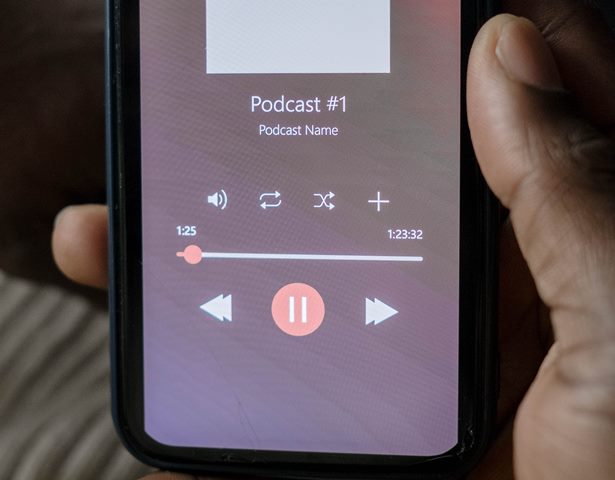Last Updated on April 16, 2023
Are you wondering how to start and produce your own podcast? Look no further. Podcasts have become an increasingly popular medium for people to consume content, and for good reason. With a podcast, you can create a platform to share your thoughts, ideas, and expertise with the world.
However, starting a podcast can be intimidating, especially if you’re new to audio production. But the good news is that anyone can produce a successful podcast with the right tools, knowledge, and a little creativity.
In this guide, we’ll show you how to start and produce a podcast that will captivate your audience and leave them eagerly anticipating your next episode.
Ready? Rolling! Action!

Choosing a Topic and Format
Choosing the right topic and format is the foundation for a successful podcast. The topic should be something you’re passionate about and knowledgeable in, while the format should suit your style and audience.
Here are tips to help you choose the perfect topic and format before you start your podcast:
Choose a niche
One of the biggest mistakes podcasters make is going too broad with their topic. While it may seem like a good idea to appeal to a broad audience, it can actually make it harder to stand out in a crowded field.
Instead, focus on a specific niche within the field. This will make it easier to find your target audience and stand out from the crowd.
Once you have identified your niche, research it thoroughly to understand the key players, influencers, and existing content. This will help you identify gaps in the market and find a unique angle for your podcast.
Research
If you’re going to start a successful podcast, then you need to do some research on what’s currently available in your niche. To understand your target audience and create content that resonates with them, you should consider conducting market research.

Here are a few ways to research your audience:
- Check social media: Look for hashtags related to your topic and see what people are saying about it.
- Survey your audience: Use tools like SurveyMonkey to create a survey and ask your audience about their interests and preferences.
- Check online forums: Look for forums related to your topic and see what questions people are asking and what content they’re engaging with.
- Listen to other podcasts: Listen to podcasts in your niche to understand what content resonates with your audience.
The goal of the research is to understand what your audience wants and create content that speaks directly to them.
Consider the format
The format of your podcast should be based on your topic and audience. There are a variety of formats to choose from, including:
- Long-form: Long-form podcasts typically run for 60-90 minutes and are focused on a single topic or guest.
- Short-form: Short-form podcasts are typically 15-30 minutes and cover various topics or news stories.
- Narrative: Narrative podcasts tell a story throughout multiple episodes.
- Interview: Interview podcasts feature interviews with guests in your niche.
Make it unique
Too many podcasts look the same, sound the same, and generally have a similar goal. When you want to start your podcast, ensure you produce something unique.
One of the keys to standing out in a crowded field is finding ways to differentiate your podcast from others in your niche. This could be through your delivery style, guest selection, or content focus. Look for opportunities to provide a unique perspective or angle on your topic.
Here are a few ways to make your podcast unique:
- Bring on guests who haven’t been featured on other podcasts.
- Use humor or storytelling to make your content more engaging.
- Cover a topic from a unique angle that hasn’t been explored before.
- Experiment with different formats or styles to find what works best for your audience.
- Stay true to your passion
Ultimately, your topic should be something you’re passionate about. If you’re not interested in the topic, it will be difficult to maintain the enthusiasm needed to produce quality content.
Choose a topic that excites you, and you can speak about it with authority.
When you’re passionate about your topic, creating engaging content and connecting with your audience will be easier. Your enthusiasm will be contagious and help you stand out in a crowded field.
Read: Have Podcasts Replaced Radio?
Planning and Pre-Production of Your Podcast

This phase involves setting goals, developing a strategy, and preparing for the actual recording of the podcast.
- Define Your Goals: Start by defining the goal of your podcast. This can include your podcast’s overall theme and message, as well as specific objectives such as reaching a certain number of listeners or generating revenue.
- Develop Your Brand: Develop a strong brand identity for your podcast that reflects your goals, niche, and message. This includes creating a logo, choosing colors and fonts, and developing a consistent tone and style for your content.
- Create Your Format: Decide on the length of each episode, the frequency of release, and the overall structure of the show.
- Develop a Content Plan: Develop a content plan that includes episode topics, guest interviews, and potential segments or features. This will help you stay organized and ensure that your podcast stays on track with your goals and messaging.
- Prepare Your Equipment: Gather and prepare your recording equipment, including microphones, headphones, and recording software.
- Schedule Your Recording Sessions: Schedule recording sessions in advance to ensure that you have enough time to create high-quality content.
Launching Your Podcast
Launching your podcast is the culmination of all your hard work and planning. This moment is most critical as it will determine the success or failure of your podcast. Here are some key steps to consider when launching your podcast:

- Set a Launch Date: Determine when you want to start and launch your podcast. But while at it, give yourself enough time to prepare all the necessary assets, including your trailer episode and promotional materials.
- Submit to Podcast Directories: To reach the largest audience possible, you’ll need to submit your podcast to various directories such as Apple Podcasts, Spotify, Google Podcasts, and others. This will ensure that your podcast is discoverable by listeners who use these platforms.
- Create a Trailer Episode: A trailer episode is a short, 1-2 minute introduction to your podcast that gives potential listeners an idea of what to expect. This will be the first thing listeners hear when they discover your podcast.
- Develop Promotional Materials: To generate buzz and build excitement around your launch, create promotional materials such as graphics, social media posts, and press releases. But note that these materials should be consistent with your brand and message. It might be a great idea to start a countdown on your social media profiles to build anticipation.
- Build an Email List: An email list is a great way to keep your audience informed about your podcast’s new episodes, upcoming guests, and other news. Encourage listeners to sign up for your email list by offering exclusive content or early access to episodes.
- Consider Hosting a Launch Event: A launch event can be a great way to generate buzz and excitement around your podcast. This can be a virtual event, such as a live stream or webinar, or an in-person event if circumstances permit. Use this event to connect with your audience and build a community around your podcast.
- Monitor Your Analytics: After your launch, monitor your analytics to see how your podcast is performing. This will help you make data-driven decisions about future episodes and promotional efforts.
Growing and Engaging Your Audience
- Actively Promote Your Podcast: Promote your podcast across different platforms, including social media, email marketing, and other relevant online communities.
- Collaborate with Other Podcasts: Collaborating with other podcasters can help expand your audience and build relationships within your niche. Consider guest hosting on other podcasts, cross-promoting each other’s shows, or creating joint episodes.
- Encourage Listener Feedback: Encourage listener feedback through reviews, comments, and social media interactions. Respond to audience feedback in a timely and engaging manner to foster a sense of community and loyalty.
- Host Q&A Sessions: Host Q&A sessions with your audience to engage with listeners directly. This will also give them valuable insights and knowledge about your niche.
- Offer Exclusive Content: Offer exclusive content, such as bonus episodes or behind-the-scenes access, to incentivize listeners to engage with your podcast and stay loyal to your brand.
- Leverage Call-to-Actions: Use call-to-actions within your episodes to encourage listeners to engage with your podcast and take specific actions, such as subscribing or leaving a review.
- Analyze Your Data: Analyze data related to your podcast, including listener demographics, engagement metrics, and feedback, to better understand your audience and improve your content and engagement strategies.

Monetizing Your Podcast
Now, it’s time to make money from your podcast.
- Sponsorships: Partner with a brand or company and promote their products or services during your episodes. Sponsorships can be either dynamic (pre-recorded ads inserted into the episode during post-production) or live (read out by the host during the recording).
- Affiliate Marketing: This involves promoting a product or service and earning a commission on sales through your unique referral link. This can be a great option if you have a niche audience and can find relevant products or services to promote.
- Crowdfunding: Crowdfunding platforms such as Patreon allow listeners to support your podcast directly in exchange for exclusive content, merchandise, or other perks.
- Events and Merchandise: Consider hosting live events or creating merchandise such as t-shirts, mugs, or stickers that feature your podcast branding.
- Premium Content: Consider offering premium content, such as additional episodes or exclusive interviews, for a subscription fee. This can be a great option if you have a dedicated audience willing to pay for more content.
- Licensing: Consider licensing your podcast content to other platforms or media outlets. This can be a great way to generate revenue while reaching new audiences.
- Donations: Let listeners donate directly to your podcast through platforms like PayPal or Ko-Fi. This can be an excellent option for listeners who want to support your podcast but may not be interested in other monetization methods.
Before you go…
Hey, thank you for reading this blog to the end. I hope it was helpful. Let me tell you a little bit about Nicholas Idoko Technologies. We help businesses and companies build an online presence by developing web, mobile, desktop, and blockchain applications.
We also help aspiring software developers and programmers learn the skills they need to have a successful career. Take your first step to become a programming boss by joining our Learn To Code academy today!










